
Story
Who’s Hoo?
The Owl Club’s debutante debuts set the stage for many prestigious African Americans in the Mile High City.
“You guys are nothin’ but a bunch of night owls.” For eight hardworking railroad pullman, waiters, and businessmen, the house at 2538 Marion Street was the perfect place for late-night weekend functions. At times, a young Charles “CT'' Smith would sneak down to the basement, and watch his father play cards and spread laughter and fellowship with friends. Little did he know he was watching the gentlemen who would change African-American history and culture in the heart of Denver.
In 1941, Ferris Cassius, Sr., Dillard Collins, Howard Denton, James R. Gross, C. Columbus Johnson, Ralph D. Mason, Dee Smith, and Carl Terrell had been spending most of their Saturday nights together. But one night, the group set their cards aside to start thinking about how to create a social club. As the idea evolved, these founders determined that their club’s main mission would be to recognize the academic excellence of young African-American women of Denver’s Five Points, Whittier, and Park Hill neighborhoods. They were all a bunch of night owls, so the group decided that The Owl Club would be the only appropriate name. Since receiving its state charter on March 24th, 1949 as a non-profit organization, The Owl Club has presented approximately 1,600 (and counting) young African American women as Debutantes of Denver.
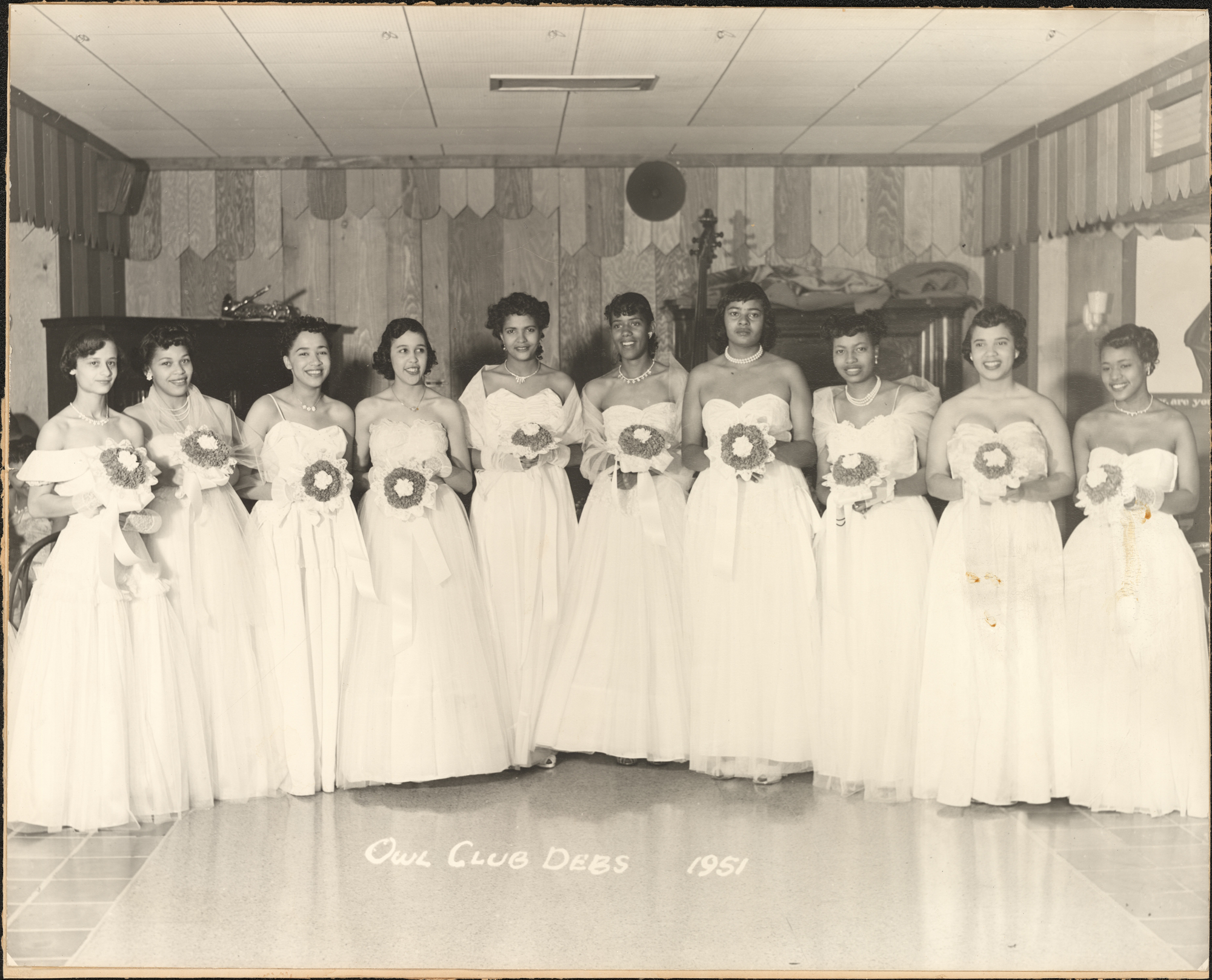
The Inaugural 1951 Debutantes of East and Manual High School gather for a group photo during their Debutante Ball.
The first presentation and debutante ball took place in 1951, debuting ten young women from East and Manual High School. The following year, Owlette Ernestine Smith, wife of Owl George W. Smith Jr., choreographed the Owl Club’s signature dance, “Waltz of the Bells,” one of the many traditions of the cotillion. In 1960, the founding members took the money they collected (some from all of those card-playing nights) and purchased the current Owl Club House located at 2815 Madison Street.
Debutante Denver
Class, elegance, grace, poise, and beauty define debutante and cotillion culture. In European and Western culture, the presentation and ball, otherwise known as the cotillion, represents the social debut of young women who were eligible for marriage and their introduction to high society. Debutante culture came to the United States early in the nation’s history, with the first African-American debutante announcement appearing in New York newspapers in 1778. Known at the time as the Ethiopian Ball, the wives of free Black men serving in the Royal Ethiopian Regiment mingled with the wives of other British officers, representing one of the few avenues of interracial social interaction available at the time.
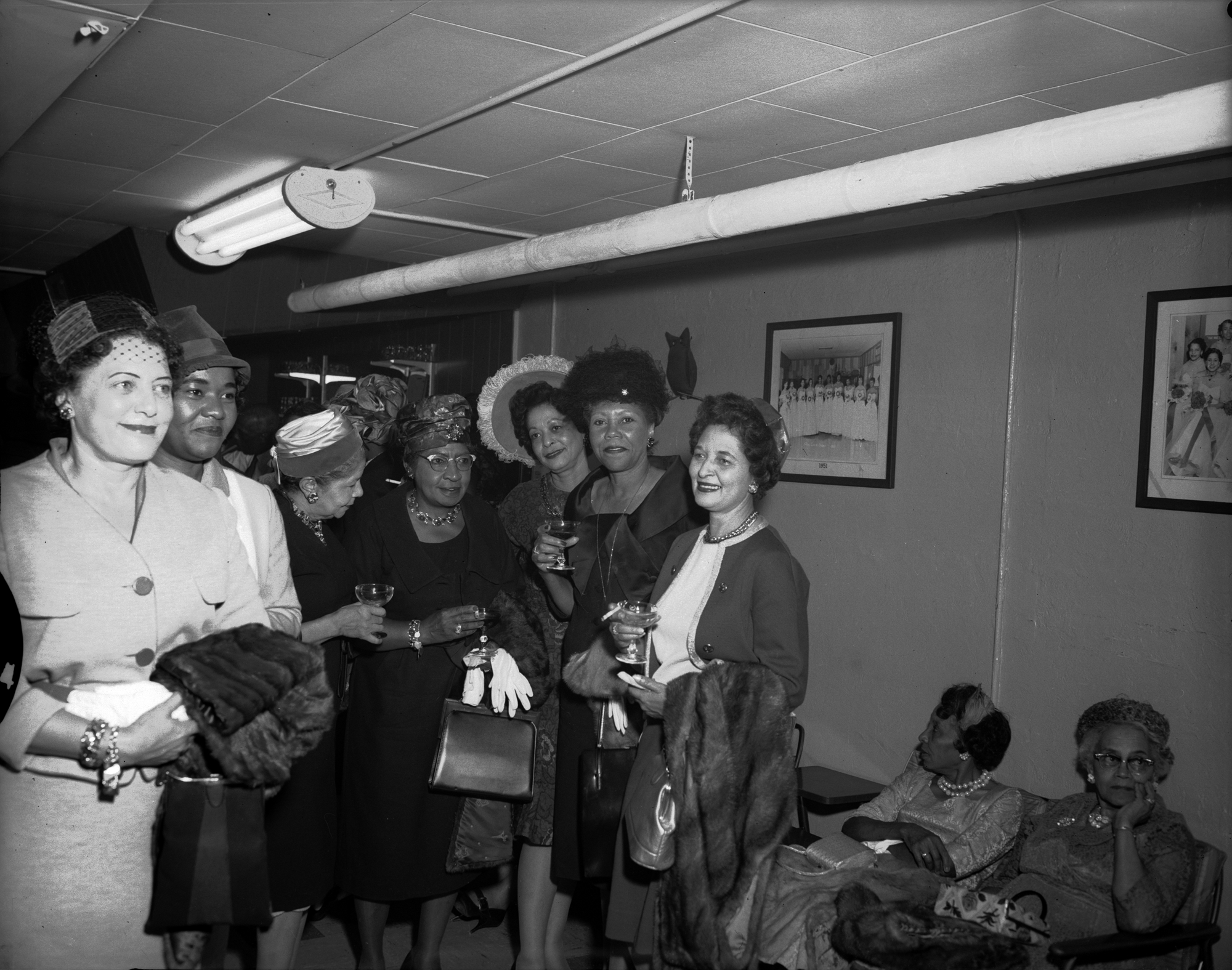
Owlettes gather and mingle over cocktails while in attendance for an event at the Owl Club House.
Debutante clubs maintained their importance throughout American history, and in African-American communities, they became spaces created to defy stereotypes placed on Black people and their culture. African American debutantes, rather than preparing women for marriage or acceptance into high society, were prepped in professional development, networking, and getting accustomed to being in spaces outside of their protected and familiar communities. The balls strove to showcase women who defined varying standards of beauty, academic achievement, and the continuation of education beyond high school. Their history shows us the presence of fathers, uncles, brothers, and other male role models, and debunks the misconception that Black men are not present in their families' day-to-day lives.
The Owl Club of Denver is part of this long tradition, and is the oldest practicing African American debutante organization in the city. They have redefined the meaning of a debutante and helped create representations of beauty, academic achievement, and acceptance for a community that’s often been misrepresented and forgotten. Owl Club members have actively supported thousands of members beyond their debutante presentations.
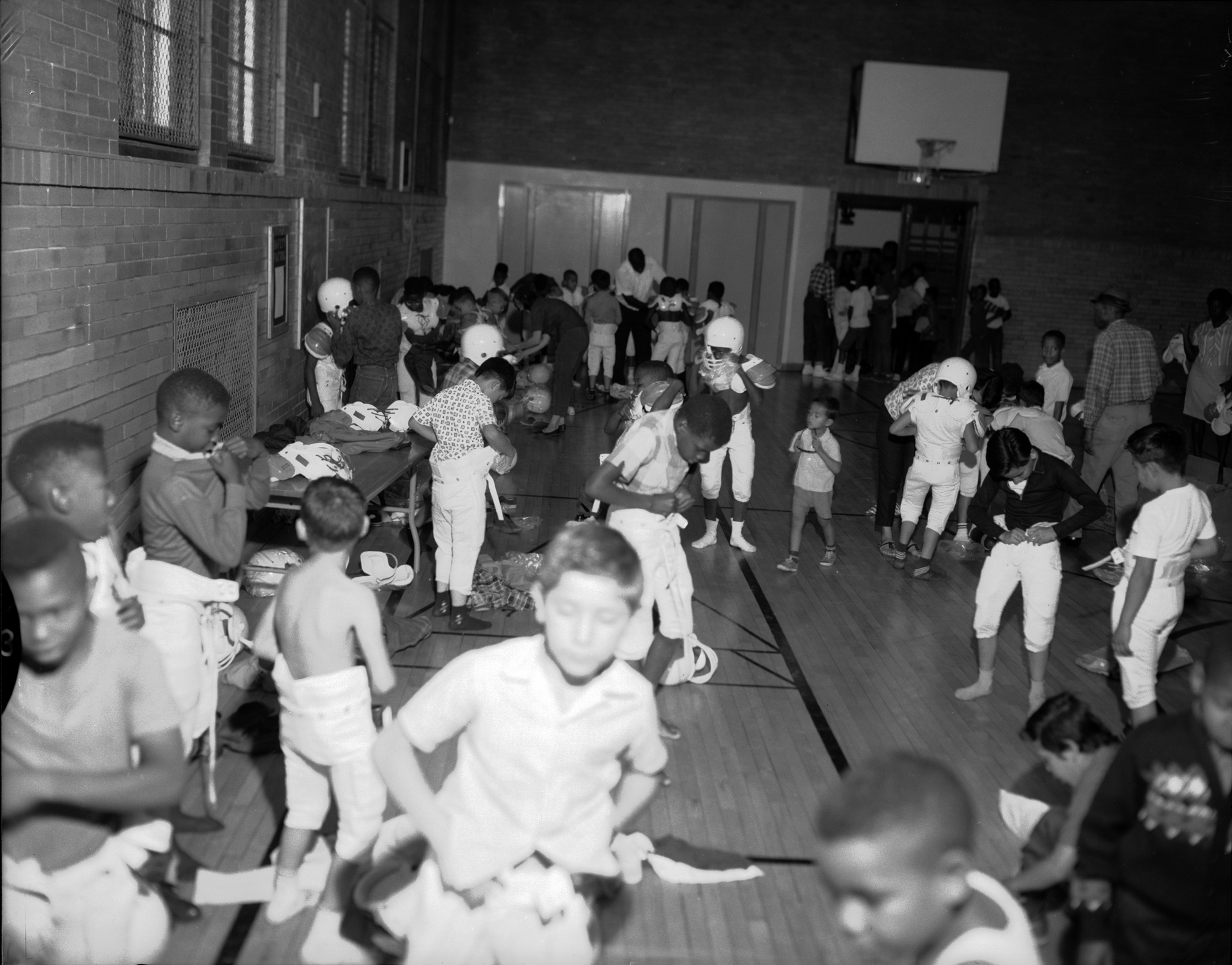
Young boys and players on the Owl Club’s Little League Football team gather in a gymnasium to suit up for a game. They are assisted by members of the Owl Club.
In 1964 and 1965 for example, former Owl Club member Omar Blair formed the Owl Club Youth Incentive, Athletic & Scholarship Association. This initiative was intended to help youth in East Denver hone their football skills for high school games. The committee was able to bring the NBA to play two pre-season games in the Mile High City before Denver joined the association. The proceeds from the event financed the Owls Little League football team. In 1979, member William Kirk founded the Owl Club Scholarship Fund, which was later chartered in 1994 by members Skip Riley and Penfield Tate III (now Chair of History Colorado’s Board of Directors). The donated funds provided academic scholarships to the young ladies who become debutantes. During the Covid-19 pandemic, thirty-one debutantes were honored virtually for the sixty-ninth and seventieth presentations.
An Important Foundation
Beyond their impact in Denver, Owl Club members and debutantes have gone on to achieve great things. Famed Tuskegee Airman Captain and World War II veteran Omar Blair was very active in the community after moving to Denver in 1951. In 1968, he served as Commissioner of the Denver Urban Renewal Authority and helped initiate the Sixteenth Street Mall Project. In 1972, he was elected as the first African-American President of the Denver Board of Education. During his two-term post, he fought to desegregate schools and organized bussing initiatives to ensure that all students had access to resources, textbooks, and learning environments.
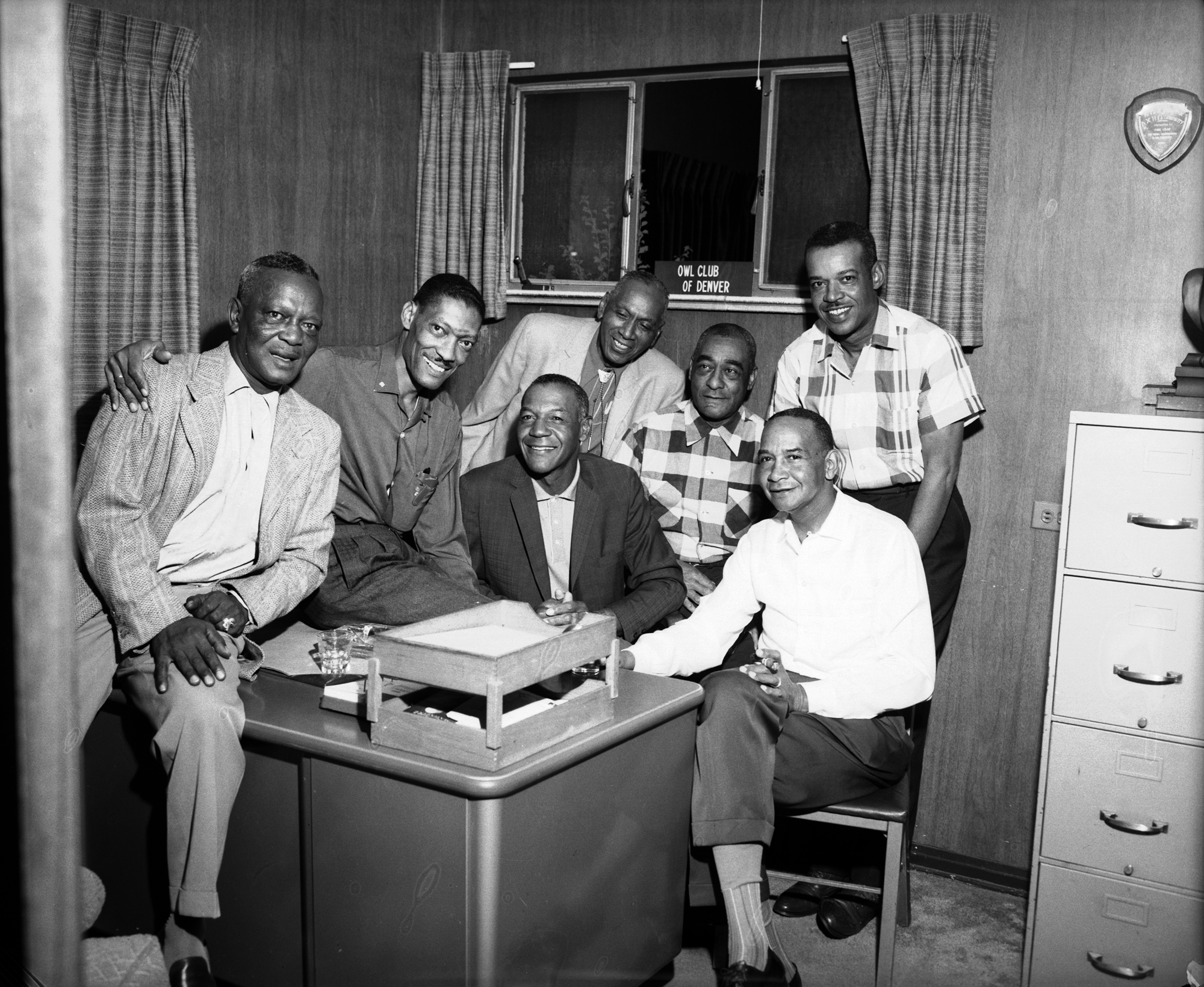
Former Owls gather for a group photo in the Owl Club House office.
Elvin Caldwell, also a World War II veteran and Owl Club member, fought for many of the same causes as his good friend Omar Blair. Widely respected and one of the most significant African American policymakers in Colorado history, Caldwell accomplished a lot during the Civil Rights movement. From 1950 to 1955, he was elected to the Colorado House of Representatives and served in the state legislature. In 1952, he was also a delegate to the Democratic National Convention. In 1955, he was elected to the Denver City Council and became the first African American man to serve in a seat west of the Mississippi. Of his seven terms served, five of them were as president of the council. Under his leadership, Caldwell was able to fund the Skyline Urban Renewal Project, the Denver General Hospital Facility (now Denver Health), and oversee the implementation of Colorado’s first Fair Employment Practices Act. In 2003, the Blair-Caldwell African American Research Library was named in honor of the duo's work and commitment to African-American communities in Denver.
Owl Club member Charles “CT” Smith would go on to join the Denver Police Department in 1959, where he would become the fourth African-American division Chief in DPD history. In his service of thirty-six years, Smith would connect with prominent African American leaders such as Martin Luther King Jr. and created Denver’s Crime Stoppers program. His initiatives were aimed at making Denver safer and aid in crime prevention.
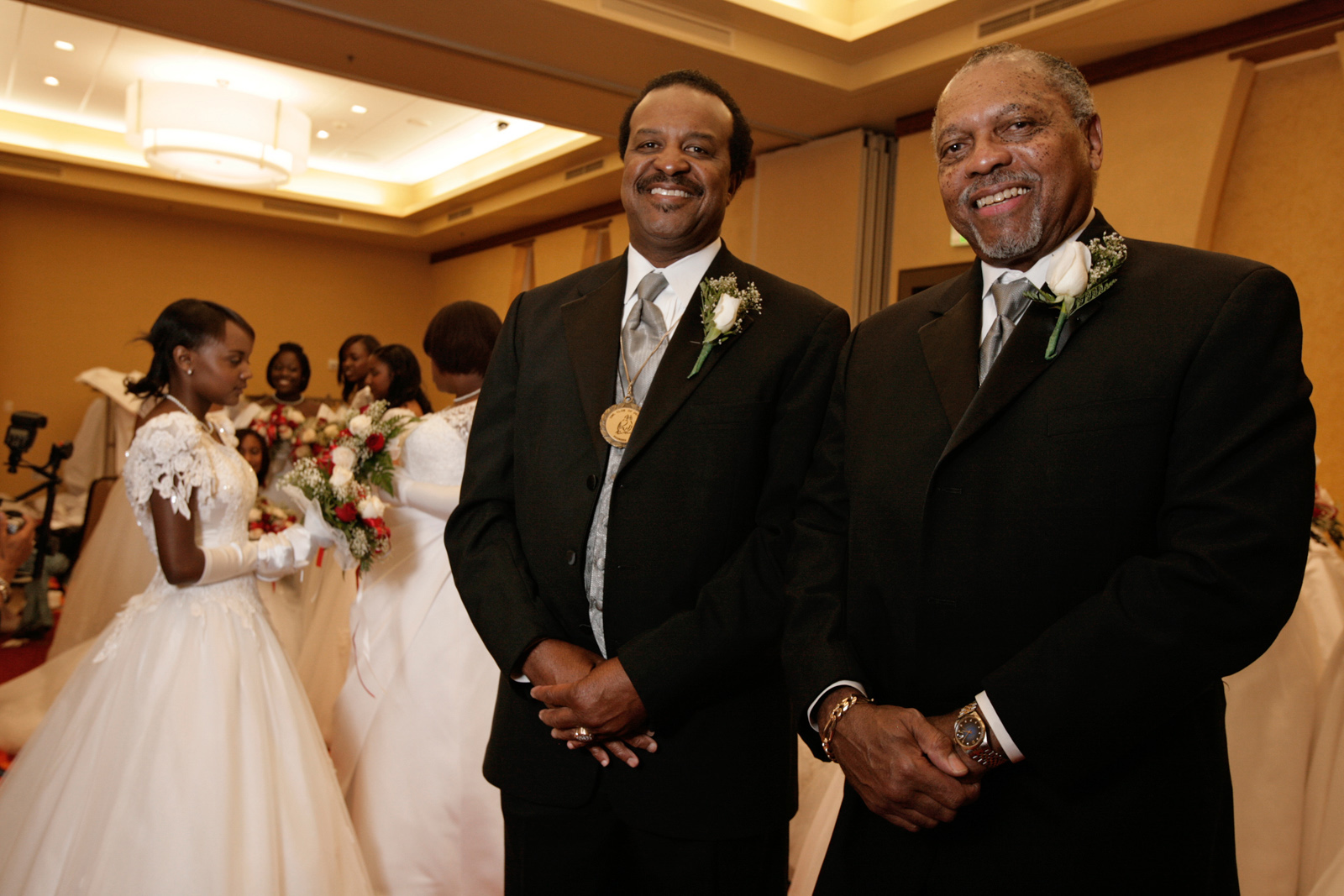
Skip Riley (Left) and Charles “CT” Smith (right) smile brightly for the cameras while attending the 56th annual Owl Club of Denver Debutante Ball, hosted at Marriott City Center.
Condoleezza Rice, a 1971 Owl Club debutante, fit the Owl Club’s debutante image from an early age. Noted as a child prodigy, Condoleezza Rice took an interest in music, and was able to read sheet music before learning to read words. Her intellect was apparent as she carried on through her education, where her first major accomplishment was graduating high school at the age of sixteen. She initially enrolled in college as a music major with hopes of becoming a concert pianist, but changed course after taking a class on international politics. At the age of nineteen, she graduated cum laude from the University of Denver with a Bachelor of Arts in political science.
By twenty-six, Dr. Rice held a PhD in political science, also from the University of Denver. She went on to be a political science professor at Stanford University, and would later become the first woman, the youngest, and the first African-American Provost in the university’s history. During her political career, Condoleezza Rice would become the first female African American Secretary of State and first woman to serve as national security advisor. In 2022, Condoleezza Rice became a part-owner of the Denver Broncos, becoming one of the very small percentage of non-white owners within the National Football League.
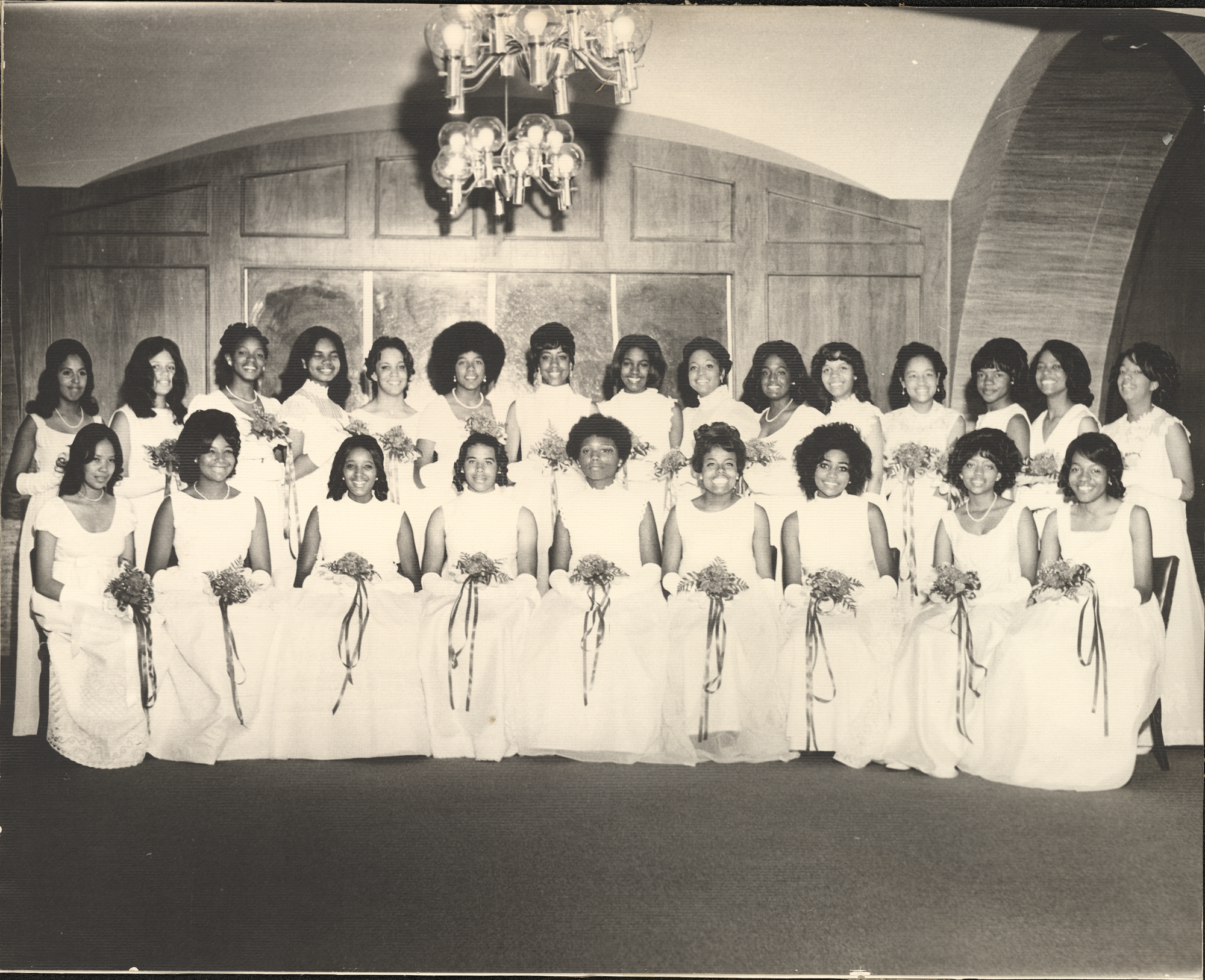
The 1971 Owl Club Debutantes gather for their group photo. Former US Secretary of State, Condoleezza Rice, is featured standing in the back row fourth from the left.
In a 2023 oral history now housed at History Colorado, current Owl Club members Alonzo E. Butler, Robert B. Pratt III, Maurice Goodgaine, Derris Newman, Maurice Dismukes, Jeffrey T. Smith, Theron G. Labrie, Marvin Pierce, Ronald Washington, Skip Riley, Charles T. Smith, recalled that the organization’s significance comes from its mission to foster community development, create professional connections, and provide mentors are the elements that make the Owl Club so critical to Denver’s history.
Founded in a time when African Americans were constantly seeking safe spaces to belong and celebrate one another, member Maurice Goodgaine is proud of the organization’s “dedication to excellence,” and a life lived without barriers. Today, the Owl Club continues to uplift the African-American community through its twin missions of fostering academic excellence and social and civic engagement.
